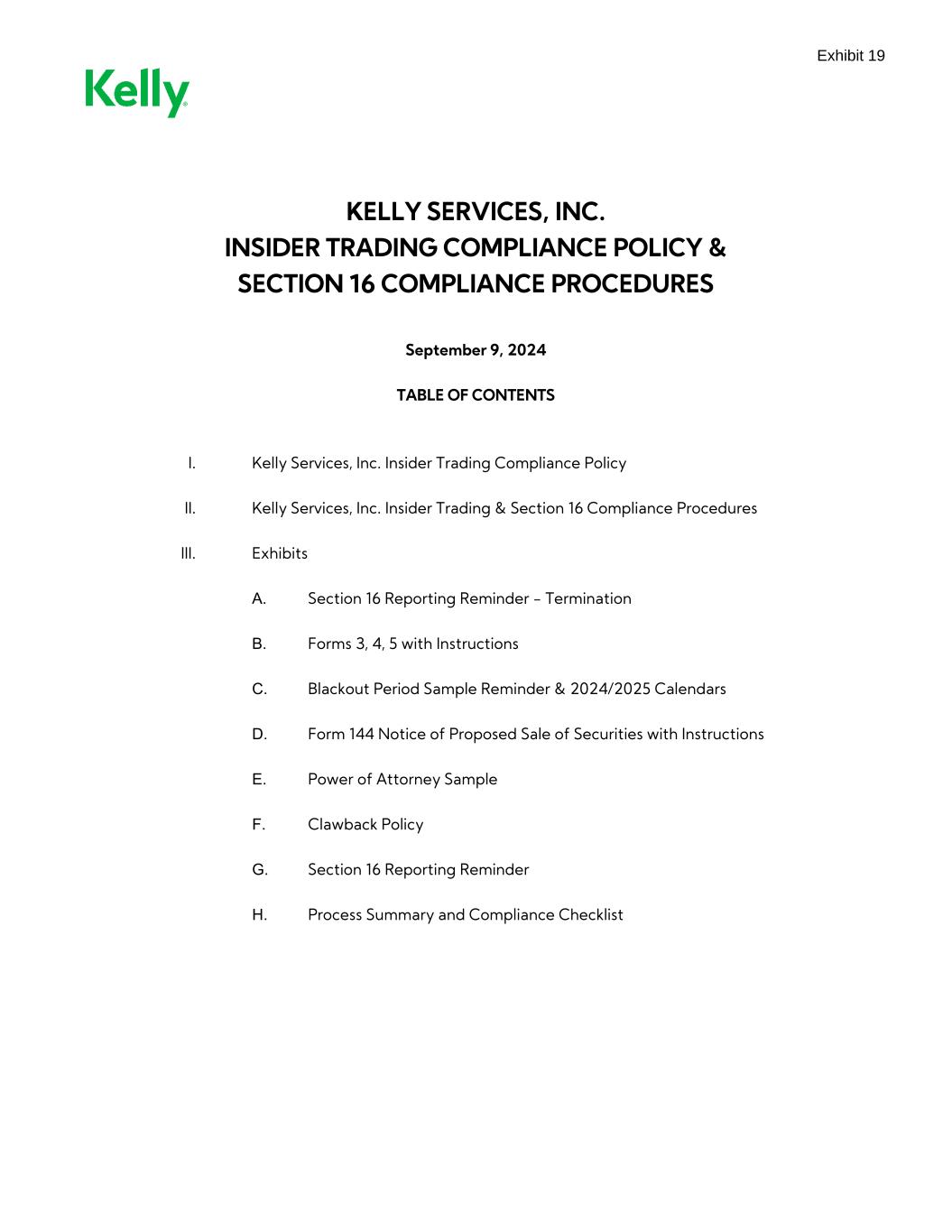
KELLY SERVICES, INC. INSIDER TRADING COMPLIANCE POLICY & SECTION 16 COMPLIANCE PROCEDURES September 9, 2024 TABLE OF CONTENTS I. Kelly Services, Inc. Insider Trading Compliance Policy II. Kelly Services, Inc. Insider Trading & Section 16 Compliance Procedures III. Exhibits A. Section 16 Reporting Reminder - Termination B. Forms 3, 4, 5 with Instructions C. Blackout Period Sample Reminder & 2024/2025 Calendars D. Form 144 Notice of Proposed Sale of Securities with Instructions E. Power of Attorney Sample F. Clawback Policy G. Section 16 Reporting Reminder H. Process Summary and Compliance Checklist
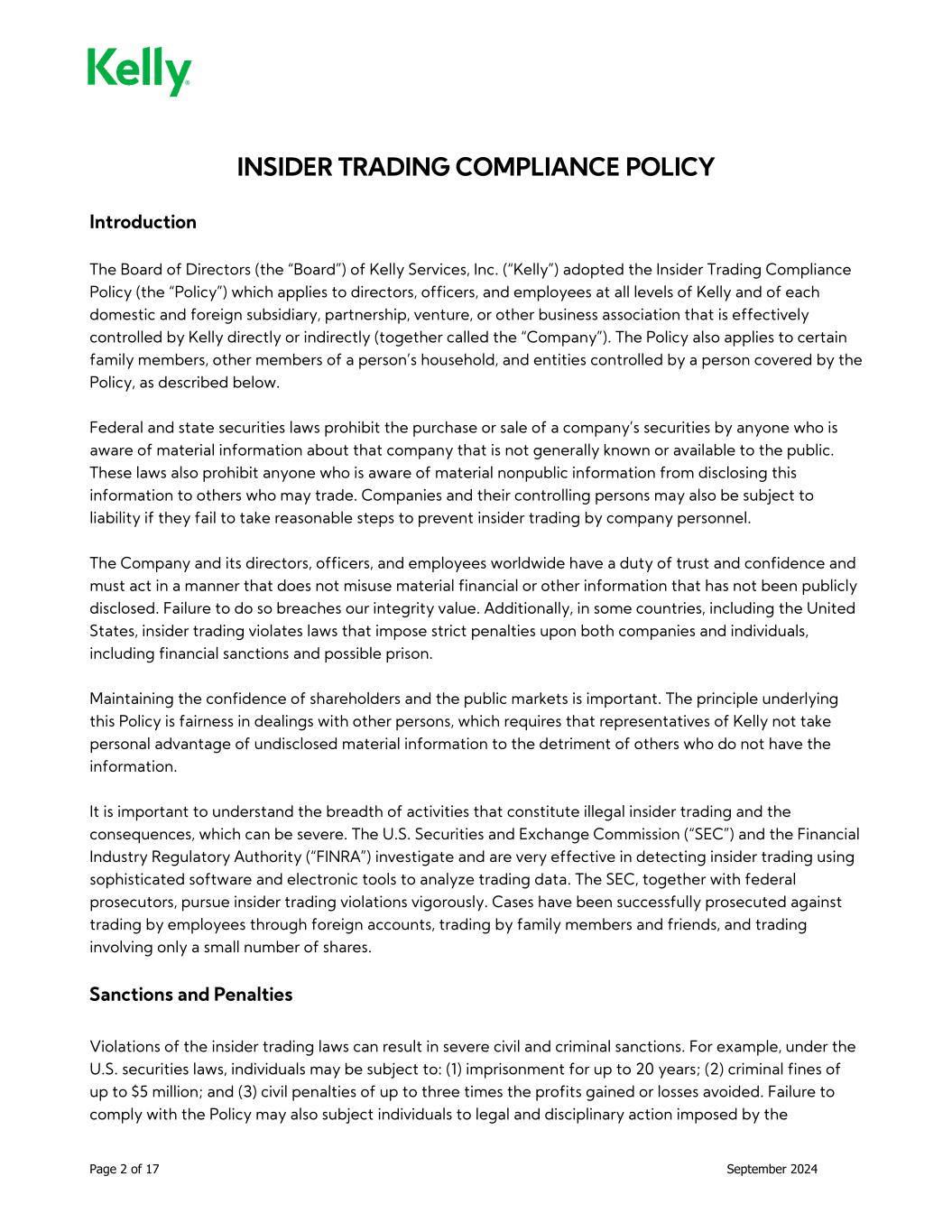
Page 2 of 17 September 2024 INSIDER TRADING COMPLIANCE POLICY Introduction The Board of Directors (the “Board”) of Kelly Services, Inc. (“Kelly”) adopted the Insider Trading Compliance Policy (the “Policy”) which applies to directors, officers, and employees at all levels of Kelly and of each domestic and foreign subsidiary, partnership, venture, or other business association that is effectively controlled by Kelly directly or indirectly (together called the “Company”). The Policy also applies to certain family members, other members of a person’s household, and entities controlled by a person covered by the Policy, as described below. Federal and state securities laws prohibit the purchase or sale of a company’s securities by anyone who is aware of material information about that company that is not generally known or available to the public. These laws also prohibit anyone who is aware of material nonpublic information from disclosing this information to others who may trade. Companies and their controlling persons may also be subject to liability if they fail to take reasonable steps to prevent insider trading by company personnel. The Company and its directors, officers, and employees worldwide have a duty of trust and confidence and must act in a manner that does not misuse material financial or other information that has not been publicly disclosed. Failure to do so breaches our integrity value. Additionally, in some countries, including the United States, insider trading violates laws that impose strict penalties upon both companies and individuals, including financial sanctions and possible prison. Maintaining the confidence of shareholders and the public markets is important. The principle underlying this Policy is fairness in dealings with other persons, which requires that representatives of Kelly not take personal advantage of undisclosed material information to the detriment of others who do not have the information. It is important to understand the breadth of activities that constitute illegal insider trading and the consequences, which can be severe. The U.S. Securities and Exchange Commission (“SEC”) and the Financial Industry Regulatory Authority (“FINRA”) investigate and are very effective in detecting insider trading using sophisticated software and electronic tools to analyze trading data. The SEC, together with federal prosecutors, pursue insider trading violations vigorously. Cases have been successfully prosecuted against trading by employees through foreign accounts, trading by family members and friends, and trading involving only a small number of shares. Sanctions and Penalties Violations of the insider trading laws can result in severe civil and criminal sanctions. For example, under the U.S. securities laws, individuals may be subject to: (1) imprisonment for up to 20 years; (2) criminal fines of up to $5 million; and (3) civil penalties of up to three times the profits gained or losses avoided. Failure to comply with the Policy may also subject individuals to legal and disciplinary action imposed by the
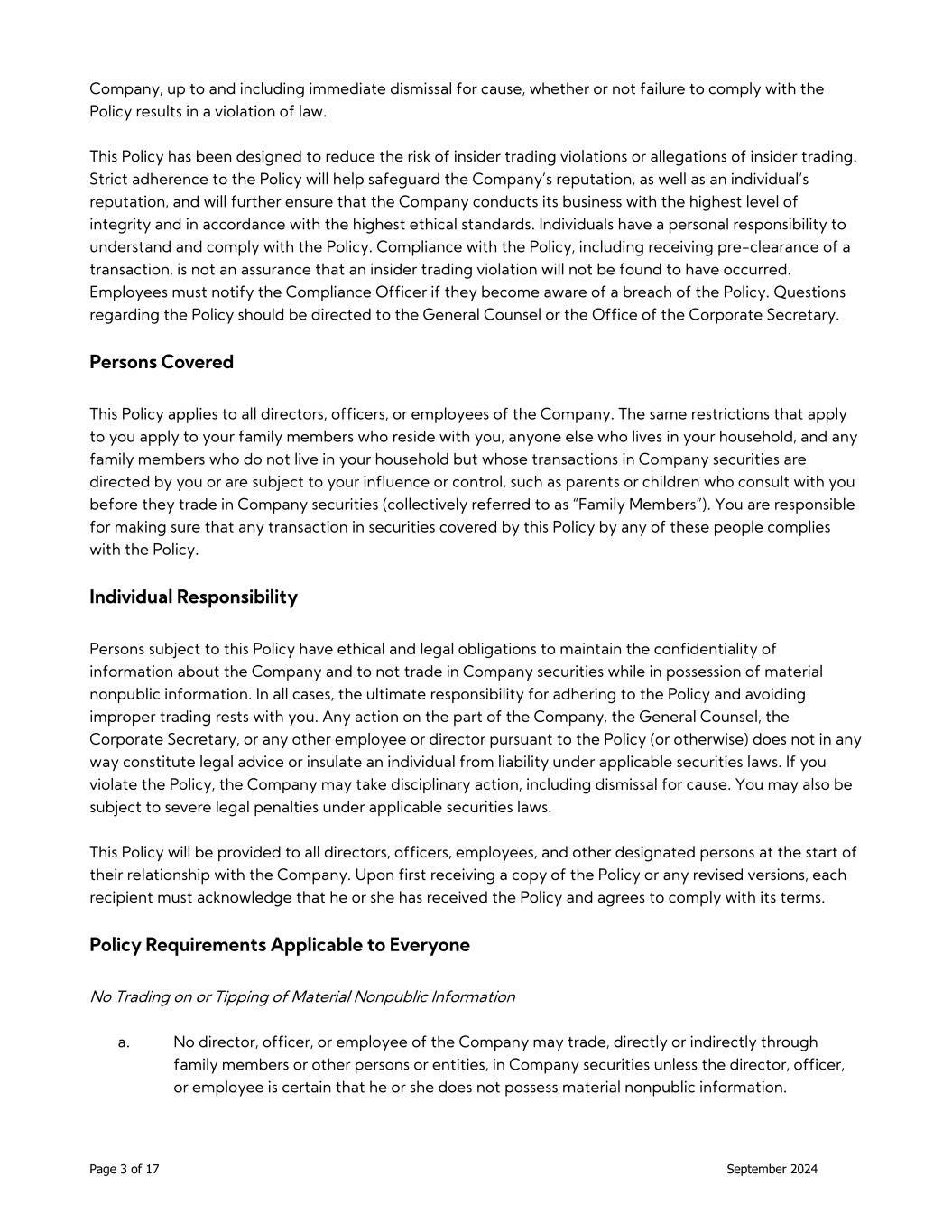
Page 3 of 17 September 2024 Company, up to and including immediate dismissal for cause, whether or not failure to comply with the Policy results in a violation of law. This Policy has been designed to reduce the risk of insider trading violations or allegations of insider trading. Strict adherence to the Policy will help safeguard the Company’s reputation, as well as an individual’s reputation, and will further ensure that the Company conducts its business with the highest level of integrity and in accordance with the highest ethical standards. Individuals have a personal responsibility to understand and comply with the Policy. Compliance with the Policy, including receiving pre-clearance of a transaction, is not an assurance that an insider trading violation will not be found to have occurred. Employees must notify the Compliance Officer if they become aware of a breach of the Policy. Questions regarding the Policy should be directed to the General Counsel or the Office of the Corporate Secretary. Persons Covered This Policy applies to all directors, officers, or employees of the Company. The same restrictions that apply to you apply to your family members who reside with you, anyone else who lives in your household, and any family members who do not live in your household but whose transactions in Company securities are directed by you or are subject to your influence or control, such as parents or children who consult with you before they trade in Company securities (collectively referred to as “Family Members”). You are responsible for making sure that any transaction in securities covered by this Policy by any of these people complies with the Policy. Individual Responsibility Persons subject to this Policy have ethical and legal obligations to maintain the confidentiality of information about the Company and to not trade in Company securities while in possession of material nonpublic information. In all cases, the ultimate responsibility for adhering to the Policy and avoiding improper trading rests with you. Any action on the part of the Company, the General Counsel, the Corporate Secretary, or any other employee or director pursuant to the Policy (or otherwise) does not in any way constitute legal advice or insulate an individual from liability under applicable securities laws. If you violate the Policy, the Company may take disciplinary action, including dismissal for cause. You may also be subject to severe legal penalties under applicable securities laws. This Policy will be provided to all directors, officers, employees, and other designated persons at the start of their relationship with the Company. Upon first receiving a copy of the Policy or any revised versions, each recipient must acknowledge that he or she has received the Policy and agrees to comply with its terms. Policy Requirements Applicable to Everyone No Trading on or Tipping of Material Nonpublic Information a. No director, officer, or employee of the Company may trade, directly or indirectly through family members or other persons or entities, in Company securities unless the director, officer, or employee is certain that he or she does not possess material nonpublic information.
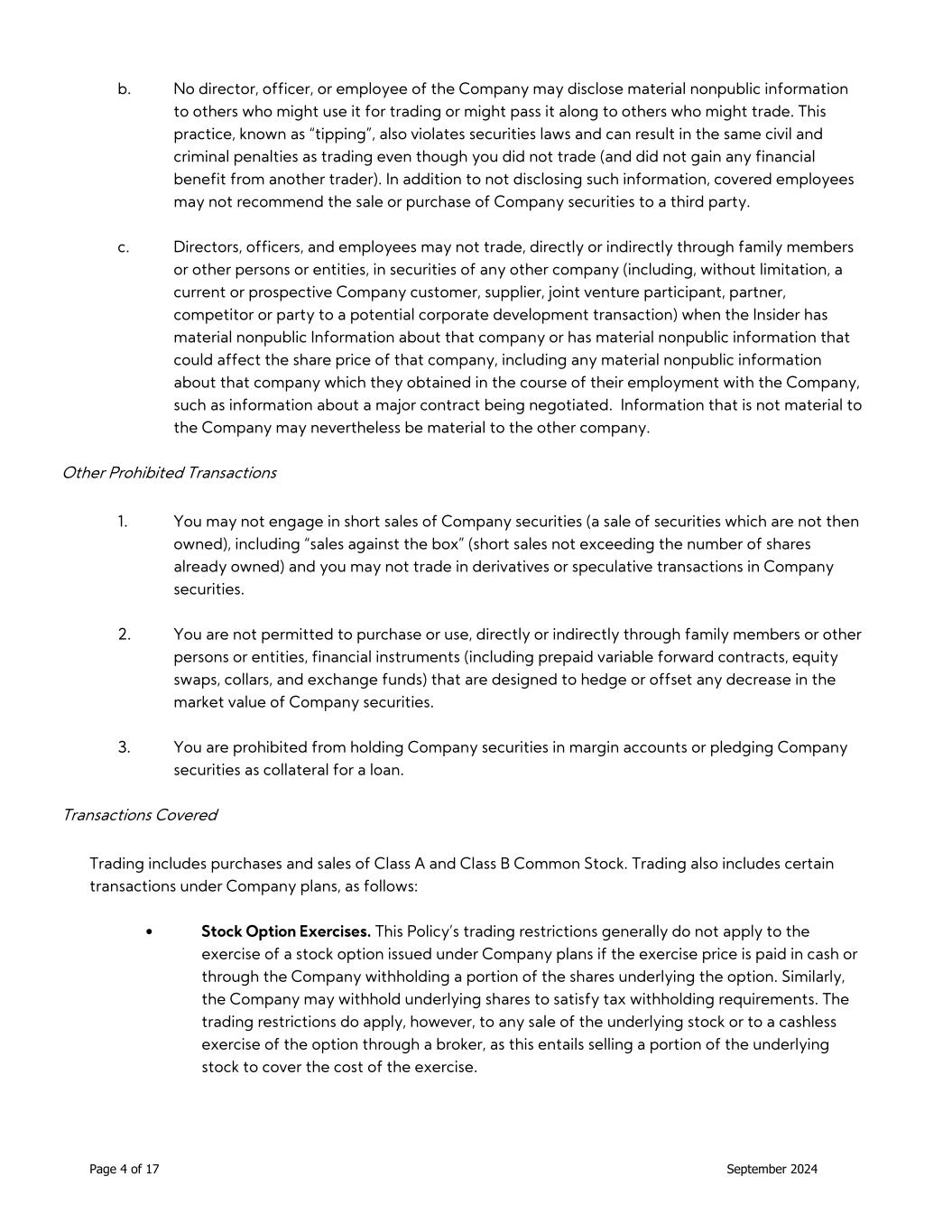
Page 4 of 17 September 2024 b. No director, officer, or employee of the Company may disclose material nonpublic information to others who might use it for trading or might pass it along to others who might trade. This practice, known as “tipping”, also violates securities laws and can result in the same civil and criminal penalties as trading even though you did not trade (and did not gain any financial benefit from another trader). In addition to not disclosing such information, covered employees may not recommend the sale or purchase of Company securities to a third party. c. Directors, officers, and employees may not trade, directly or indirectly through family members or other persons or entities, in securities of any other company (including, without limitation, a current or prospective Company customer, supplier, joint venture participant, partner, competitor or party to a potential corporate development transaction) when the Insider has material nonpublic Information about that company or has material nonpublic information that could affect the share price of that company, including any material nonpublic information about that company which they obtained in the course of their employment with the Company, such as information about a major contract being negotiated. Information that is not material to the Company may nevertheless be material to the other company. Other Prohibited Transactions 1. You may not engage in short sales of Company securities (a sale of securities which are not then owned), including “sales against the box” (short sales not exceeding the number of shares already owned) and you may not trade in derivatives or speculative transactions in Company securities. 2. You are not permitted to purchase or use, directly or indirectly through family members or other persons or entities, financial instruments (including prepaid variable forward contracts, equity swaps, collars, and exchange funds) that are designed to hedge or offset any decrease in the market value of Company securities. 3. You are prohibited from holding Company securities in margin accounts or pledging Company securities as collateral for a loan. Transactions Covered Trading includes purchases and sales of Class A and Class B Common Stock. Trading also includes certain transactions under Company plans, as follows: • Stock Option Exercises. This Policy’s trading restrictions generally do not apply to the exercise of a stock option issued under Company plans if the exercise price is paid in cash or through the Company withholding a portion of the shares underlying the option. Similarly, the Company may withhold underlying shares to satisfy tax withholding requirements. The trading restrictions do apply, however, to any sale of the underlying stock or to a cashless exercise of the option through a broker, as this entails selling a portion of the underlying stock to cover the cost of the exercise.
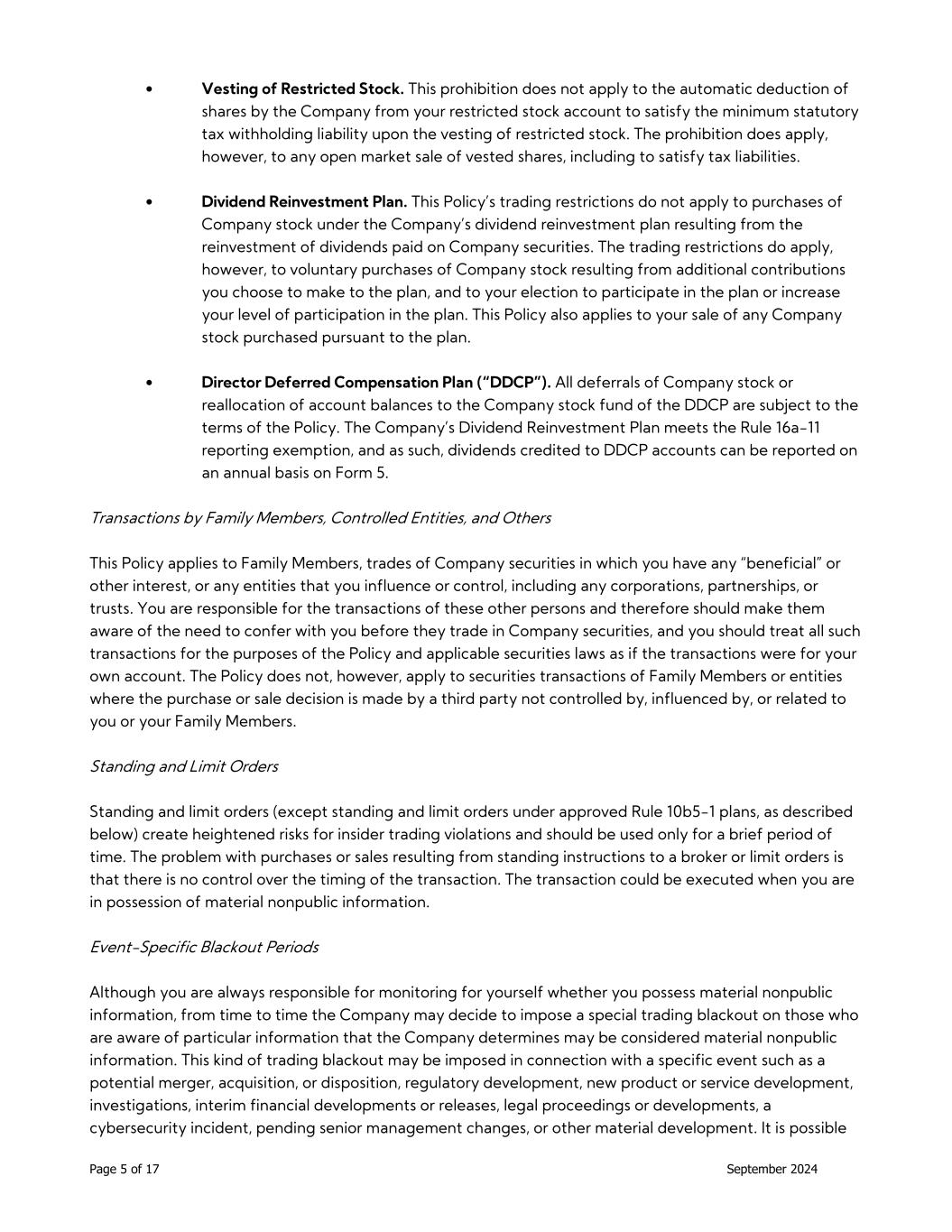
Page 5 of 17 September 2024 • Vesting of Restricted Stock. This prohibition does not apply to the automatic deduction of shares by the Company from your restricted stock account to satisfy the minimum statutory tax withholding liability upon the vesting of restricted stock. The prohibition does apply, however, to any open market sale of vested shares, including to satisfy tax liabilities. • Dividend Reinvestment Plan. This Policy’s trading restrictions do not apply to purchases of Company stock under the Company’s dividend reinvestment plan resulting from the reinvestment of dividends paid on Company securities. The trading restrictions do apply, however, to voluntary purchases of Company stock resulting from additional contributions you choose to make to the plan, and to your election to participate in the plan or increase your level of participation in the plan. This Policy also applies to your sale of any Company stock purchased pursuant to the plan. • Director Deferred Compensation Plan (“DDCP”). All deferrals of Company stock or reallocation of account balances to the Company stock fund of the DDCP are subject to the terms of the Policy. The Company’s Dividend Reinvestment Plan meets the Rule 16a-11 reporting exemption, and as such, dividends credited to DDCP accounts can be reported on an annual basis on Form 5. Transactions by Family Members, Controlled Entities, and Others This Policy applies to Family Members, trades of Company securities in which you have any “beneficial” or other interest, or any entities that you influence or control, including any corporations, partnerships, or trusts. You are responsible for the transactions of these other persons and therefore should make them aware of the need to confer with you before they trade in Company securities, and you should treat all such transactions for the purposes of the Policy and applicable securities laws as if the transactions were for your own account. The Policy does not, however, apply to securities transactions of Family Members or entities where the purchase or sale decision is made by a third party not controlled by, influenced by, or related to you or your Family Members. Standing and Limit Orders Standing and limit orders (except standing and limit orders under approved Rule 10b5-1 plans, as described below) create heightened risks for insider trading violations and should be used only for a brief period of time. The problem with purchases or sales resulting from standing instructions to a broker or limit orders is that there is no control over the timing of the transaction. The transaction could be executed when you are in possession of material nonpublic information. Event-Specific Blackout Periods Although you are always responsible for monitoring for yourself whether you possess material nonpublic information, from time to time the Company may decide to impose a special trading blackout on those who are aware of particular information that the Company determines may be considered material nonpublic information. This kind of trading blackout may be imposed in connection with a specific event such as a potential merger, acquisition, or disposition, regulatory development, new product or service development, investigations, interim financial developments or releases, legal proceedings or developments, a cybersecurity incident, pending senior management changes, or other material development. It is possible
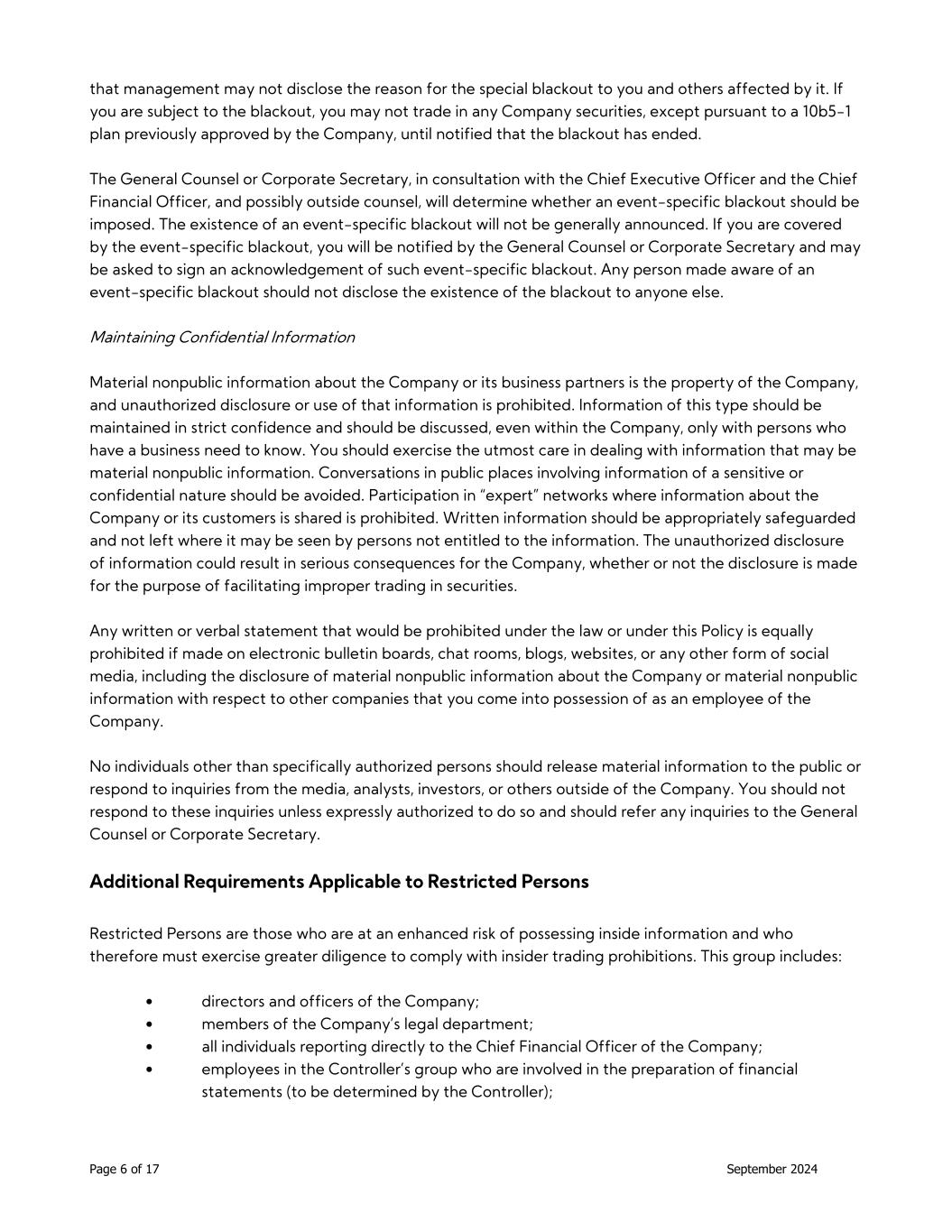
Page 6 of 17 September 2024 that management may not disclose the reason for the special blackout to you and others affected by it. If you are subject to the blackout, you may not trade in any Company securities, except pursuant to a 10b5-1 plan previously approved by the Company, until notified that the blackout has ended. The General Counsel or Corporate Secretary, in consultation with the Chief Executive Officer and the Chief Financial Officer, and possibly outside counsel, will determine whether an event-specific blackout should be imposed. The existence of an event-specific blackout will not be generally announced. If you are covered by the event-specific blackout, you will be notified by the General Counsel or Corporate Secretary and may be asked to sign an acknowledgement of such event-specific blackout. Any person made aware of an event-specific blackout should not disclose the existence of the blackout to anyone else. Maintaining Confidential Information Material nonpublic information about the Company or its business partners is the property of the Company, and unauthorized disclosure or use of that information is prohibited. Information of this type should be maintained in strict confidence and should be discussed, even within the Company, only with persons who have a business need to know. You should exercise the utmost care in dealing with information that may be material nonpublic information. Conversations in public places involving information of a sensitive or confidential nature should be avoided. Participation in “expert” networks where information about the Company or its customers is shared is prohibited. Written information should be appropriately safeguarded and not left where it may be seen by persons not entitled to the information. The unauthorized disclosure of information could result in serious consequences for the Company, whether or not the disclosure is made for the purpose of facilitating improper trading in securities. Any written or verbal statement that would be prohibited under the law or under this Policy is equally prohibited if made on electronic bulletin boards, chat rooms, blogs, websites, or any other form of social media, including the disclosure of material nonpublic information about the Company or material nonpublic information with respect to other companies that you come into possession of as an employee of the Company. No individuals other than specifically authorized persons should release material information to the public or respond to inquiries from the media, analysts, investors, or others outside of the Company. You should not respond to these inquiries unless expressly authorized to do so and should refer any inquiries to the General Counsel or Corporate Secretary. Additional Requirements Applicable to Restricted Persons Restricted Persons are those who are at an enhanced risk of possessing inside information and who therefore must exercise greater diligence to comply with insider trading prohibitions. This group includes: • directors and officers of the Company; • members of the Company’s legal department; • all individuals reporting directly to the Chief Financial Officer of the Company; • employees in the Controller’s group who are involved in the preparation of financial statements (to be determined by the Controller);
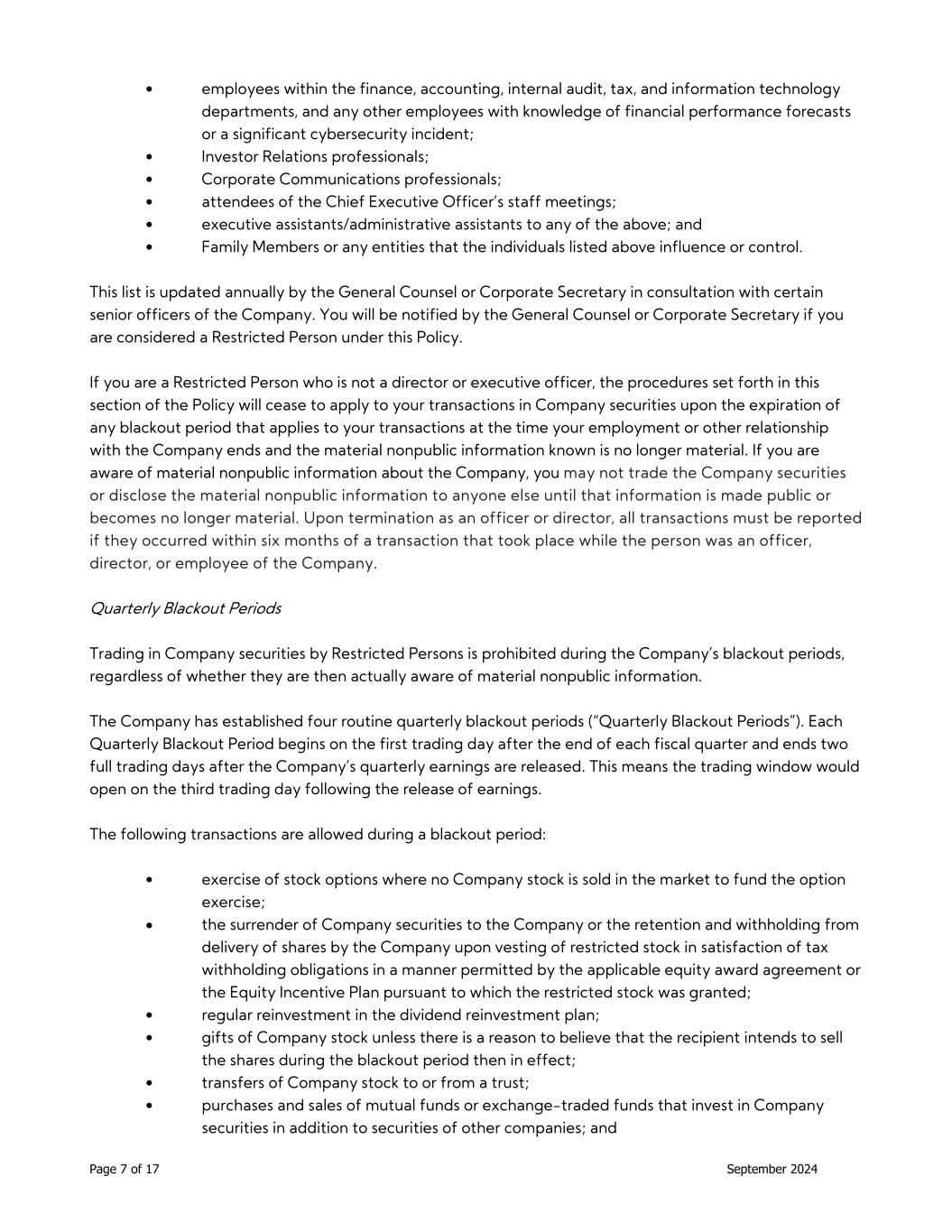
Page 7 of 17 September 2024 • employees within the finance, accounting, internal audit, tax, and information technology departments, and any other employees with knowledge of financial performance forecasts or a significant cybersecurity incident; • Investor Relations professionals; • Corporate Communications professionals; • attendees of the Chief Executive Officer’s staff meetings; • executive assistants/administrative assistants to any of the above; and • Family Members or any entities that the individuals listed above influence or control. This list is updated annually by the General Counsel or Corporate Secretary in consultation with certain senior officers of the Company. You will be notified by the General Counsel or Corporate Secretary if you are considered a Restricted Person under this Policy. If you are a Restricted Person who is not a director or executive officer, the procedures set forth in this section of the Policy will cease to apply to your transactions in Company securities upon the expiration of any blackout period that applies to your transactions at the time your employment or other relationship with the Company ends and the material nonpublic information known is no longer material. If you are aware of material nonpublic information about the Company, you may not trade the Company securities or disclose the material nonpublic information to anyone else until that information is made public or becomes no longer material. Upon termination as an officer or director, all transactions must be reported if they occurred within six months of a transaction that took place while the person was an officer, director, or employee of the Company. Quarterly Blackout Periods Trading in Company securities by Restricted Persons is prohibited during the Company’s blackout periods, regardless of whether they are then actually aware of material nonpublic information. The Company has established four routine quarterly blackout periods (“Quarterly Blackout Periods”). Each Quarterly Blackout Period begins on the first trading day after the end of each fiscal quarter and ends two full trading days after the Company’s quarterly earnings are released. This means the trading window would open on the third trading day following the release of earnings. The following transactions are allowed during a blackout period: • exercise of stock options where no Company stock is sold in the market to fund the option exercise; • the surrender of Company securities to the Company or the retention and withholding from delivery of shares by the Company upon vesting of restricted stock in satisfaction of tax withholding obligations in a manner permitted by the applicable equity award agreement or the Equity Incentive Plan pursuant to which the restricted stock was granted; • regular reinvestment in the dividend reinvestment plan; • gifts of Company stock unless there is a reason to believe that the recipient intends to sell the shares during the blackout period then in effect; • transfers of Company stock to or from a trust; • purchases and sales of mutual funds or exchange-traded funds that invest in Company securities in addition to securities of other companies; and
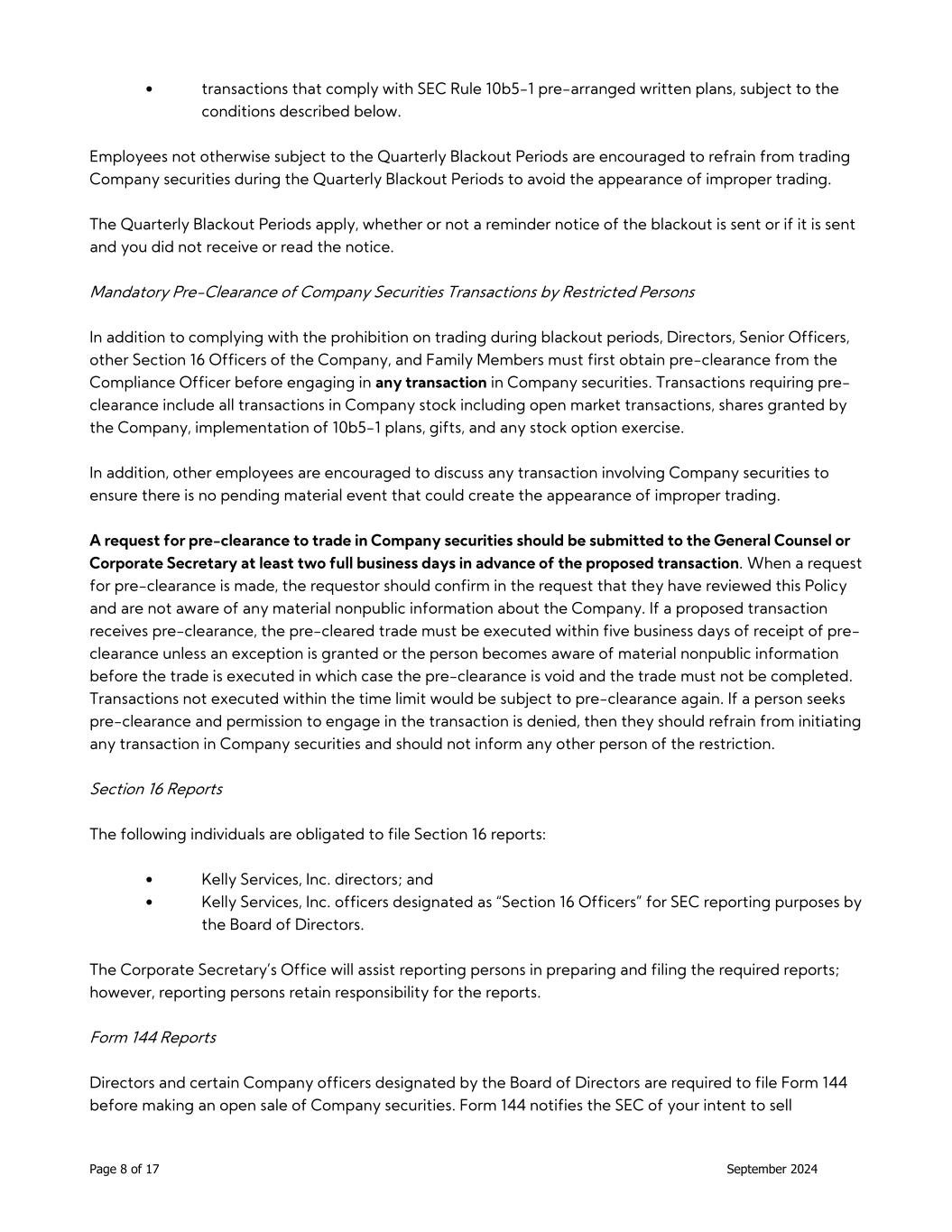
Page 8 of 17 September 2024 • transactions that comply with SEC Rule 10b5-1 pre-arranged written plans, subject to the conditions described below. Employees not otherwise subject to the Quarterly Blackout Periods are encouraged to refrain from trading Company securities during the Quarterly Blackout Periods to avoid the appearance of improper trading. The Quarterly Blackout Periods apply, whether or not a reminder notice of the blackout is sent or if it is sent and you did not receive or read the notice. Mandatory Pre-Clearance of Company Securities Transactions by Restricted Persons In addition to complying with the prohibition on trading during blackout periods, Directors, Senior Officers, other Section 16 Officers of the Company, and Family Members must first obtain pre-clearance from the Compliance Officer before engaging in any transaction in Company securities. Transactions requiring pre- clearance include all transactions in Company stock including open market transactions, shares granted by the Company, implementation of 10b5-1 plans, gifts, and any stock option exercise. In addition, other employees are encouraged to discuss any transaction involving Company securities to ensure there is no pending material event that could create the appearance of improper trading. A request for pre-clearance to trade in Company securities should be submitted to the General Counsel or Corporate Secretary at least two full business days in advance of the proposed transaction. When a request for pre-clearance is made, the requestor should confirm in the request that they have reviewed this Policy and are not aware of any material nonpublic information about the Company. If a proposed transaction receives pre-clearance, the pre-cleared trade must be executed within five business days of receipt of pre- clearance unless an exception is granted or the person becomes aware of material nonpublic information before the trade is executed in which case the pre-clearance is void and the trade must not be completed. Transactions not executed within the time limit would be subject to pre-clearance again. If a person seeks pre-clearance and permission to engage in the transaction is denied, then they should refrain from initiating any transaction in Company securities and should not inform any other person of the restriction. Section 16 Reports The following individuals are obligated to file Section 16 reports: • Kelly Services, Inc. directors; and • Kelly Services, Inc. officers designated as “Section 16 Officers” for SEC reporting purposes by the Board of Directors. The Corporate Secretary’s Office will assist reporting persons in preparing and filing the required reports; however, reporting persons retain responsibility for the reports. Form 144 Reports Directors and certain Company officers designated by the Board of Directors are required to file Form 144 before making an open sale of Company securities. Form 144 notifies the SEC of your intent to sell
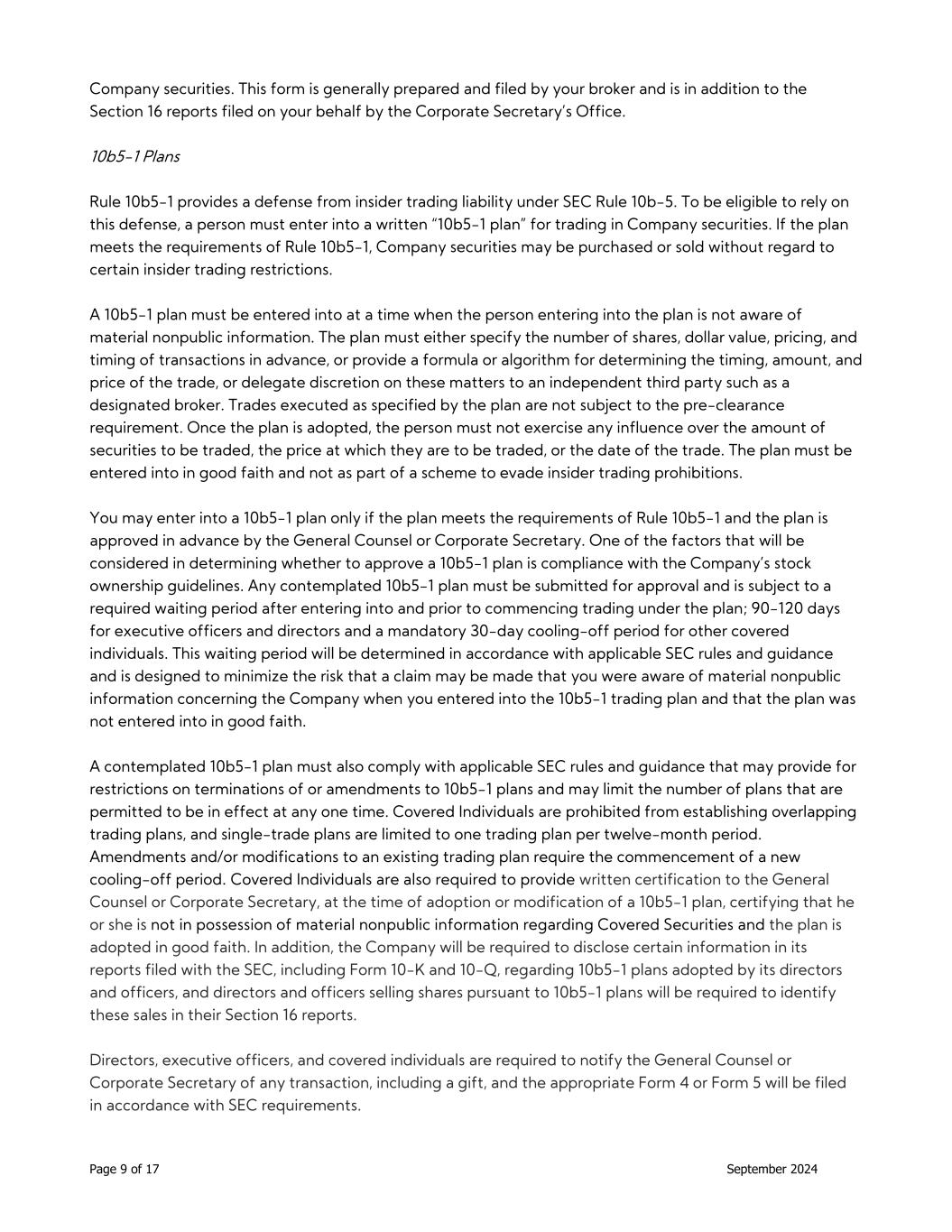
Page 9 of 17 September 2024 Company securities. This form is generally prepared and filed by your broker and is in addition to the Section 16 reports filed on your behalf by the Corporate Secretary’s Office. 10b5-1 Plans Rule 10b5-1 provides a defense from insider trading liability under SEC Rule 10b-5. To be eligible to rely on this defense, a person must enter into a written “10b5-1 plan” for trading in Company securities. If the plan meets the requirements of Rule 10b5-1, Company securities may be purchased or sold without regard to certain insider trading restrictions. A 10b5-1 plan must be entered into at a time when the person entering into the plan is not aware of material nonpublic information. The plan must either specify the number of shares, dollar value, pricing, and timing of transactions in advance, or provide a formula or algorithm for determining the timing, amount, and price of the trade, or delegate discretion on these matters to an independent third party such as a designated broker. Trades executed as specified by the plan are not subject to the pre-clearance requirement. Once the plan is adopted, the person must not exercise any influence over the amount of securities to be traded, the price at which they are to be traded, or the date of the trade. The plan must be entered into in good faith and not as part of a scheme to evade insider trading prohibitions. You may enter into a 10b5-1 plan only if the plan meets the requirements of Rule 10b5-1 and the plan is approved in advance by the General Counsel or Corporate Secretary. One of the factors that will be considered in determining whether to approve a 10b5-1 plan is compliance with the Company’s stock ownership guidelines. Any contemplated 10b5-1 plan must be submitted for approval and is subject to a required waiting period after entering into and prior to commencing trading under the plan; 90-120 days for executive officers and directors and a mandatory 30-day cooling-off period for other covered individuals. This waiting period will be determined in accordance with applicable SEC rules and guidance and is designed to minimize the risk that a claim may be made that you were aware of material nonpublic information concerning the Company when you entered into the 10b5-1 trading plan and that the plan was not entered into in good faith. A contemplated 10b5-1 plan must also comply with applicable SEC rules and guidance that may provide for restrictions on terminations of or amendments to 10b5-1 plans and may limit the number of plans that are permitted to be in effect at any one time. Covered Individuals are prohibited from establishing overlapping trading plans, and single-trade plans are limited to one trading plan per twelve-month period. Amendments and/or modifications to an existing trading plan require the commencement of a new cooling-off period. Covered Individuals are also required to provide written certification to the General Counsel or Corporate Secretary, at the time of adoption or modification of a 10b5-1 plan, certifying that he or she is not in possession of material nonpublic information regarding Covered Securities and the plan is adopted in good faith. In addition, the Company will be required to disclose certain information in its reports filed with the SEC, including Form 10-K and 10-Q, regarding 10b5-1 plans adopted by its directors and officers, and directors and officers selling shares pursuant to 10b5-1 plans will be required to identify these sales in their Section 16 reports. Directors, executive officers, and covered individuals are required to notify the General Counsel or Corporate Secretary of any transaction, including a gift, and the appropriate Form 4 or Form 5 will be filed in accordance with SEC requirements.

Page 10 of 17 September 2024 Pre-planned trading programs are available only to members of the Board, executive officers, and such other Company employees as may be designated from time to time by the Chief Executive Officer, the Corporate Secretary, and the General Counsel. The Company reserves the right to disapprove any submitted plan. A copy of any approved 10b5-1 plan will be maintained by the Corporate Governance group and the existence and termination of such plan may be publicly disclosed by the Company. Reporting of Violations Any insider who violates this Policy or any federal, state, or self-regulatory organization (“SRO”) rule or law governing insider trading or tipping or knows of any such violation by any other insider, must report the violation immediately to the General Counsel or Corporate Secretary. Upon receipt of notice of a potential violation of the Policy, the General Counsel or Corporate Secretary will investigate with the assistance of outside counsel if necessary to determine whether a violation may have occurred. The General Counsel or Corporate Secretary shall report material violations of this Policy to the Audit Committee and upon determining that any such violation has occurred, will determine appropriate discipline for the insider, which may include immediate termination. The Audit Committee may report the violation to federal or state law enforcement agencies and/or applicable SRO. Definitions Blackout periods are timeframes when corporate insiders are forbidden to trade in the Company’s securities. These restrictions exist to help reduce the risk of insider trading by individuals who have access to nonpublic material information. Blackout periods typically occur in two main categories: quarterly blackout periods and event-specific blackout periods. Securities include stock (i.e., Class A and Class B common stock), options to purchase common stock, bonds, notes and debentures (including convertible debt securities), put and call options or other derivative securities, and other marketable securities of any company. Trading includes buying or selling securities, and transactions including pledges, hedges, loans, and gifts of Company securities, as well as other direct or indirect transfers of Company securities, deferred compensation, or deferred fee plans. Material information is any information that a reasonable investor would likely consider important in making a decision to buy, sell, or hold securities. Financial information is frequently material, even if it covers only part of a fiscal period or less than all of the Company’s operations since either of these might convey enough information about the Company’s consolidated results to be considered material information. Other common examples of information that may be material include: • financial or operating results, positive or negative; • financial forecasts of any kind, including earnings estimates or significant changes to previously announced earnings estimates, upwards or downwards; • Company projections that differ significantly from external projections; • information regarding sales, revenues, or earnings (including projections); • the need to restate financial statements; • significant business trends and metrics;
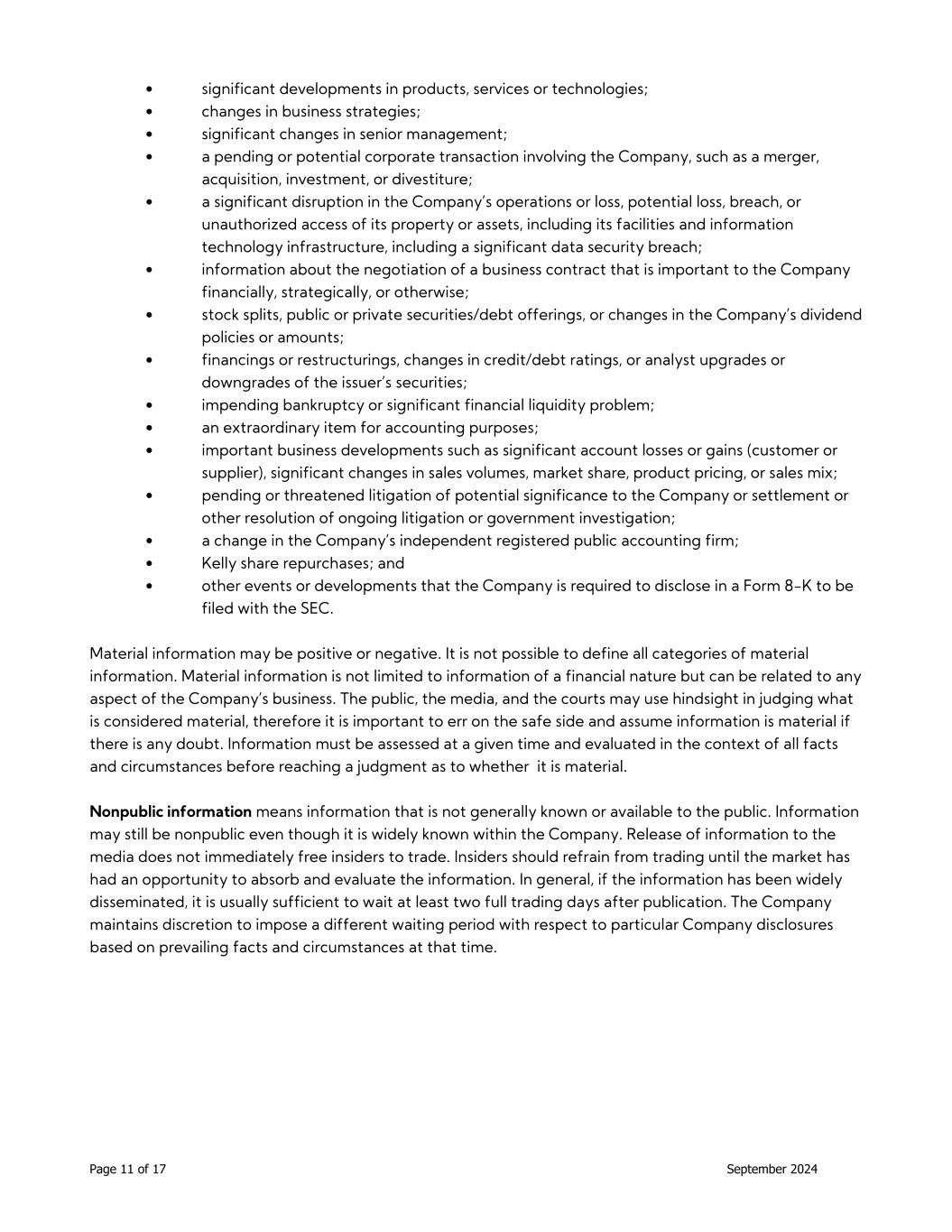
Page 11 of 17 September 2024 • significant developments in products, services or technologies; • changes in business strategies; • significant changes in senior management; • a pending or potential corporate transaction involving the Company, such as a merger, acquisition, investment, or divestiture; • a significant disruption in the Company’s operations or loss, potential loss, breach, or unauthorized access of its property or assets, including its facilities and information technology infrastructure, including a significant data security breach; • information about the negotiation of a business contract that is important to the Company financially, strategically, or otherwise; • stock splits, public or private securities/debt offerings, or changes in the Company’s dividend policies or amounts; • financings or restructurings, changes in credit/debt ratings, or analyst upgrades or downgrades of the issuer’s securities; • impending bankruptcy or significant financial liquidity problem; • an extraordinary item for accounting purposes; • important business developments such as significant account losses or gains (customer or supplier), significant changes in sales volumes, market share, product pricing, or sales mix; • pending or threatened litigation of potential significance to the Company or settlement or other resolution of ongoing litigation or government investigation; • a change in the Company’s independent registered public accounting firm; • Kelly share repurchases; and • other events or developments that the Company is required to disclose in a Form 8-K to be filed with the SEC. Material information may be positive or negative. It is not possible to define all categories of material information. Material information is not limited to information of a financial nature but can be related to any aspect of the Company’s business. The public, the media, and the courts may use hindsight in judging what is considered material, therefore it is important to err on the safe side and assume information is material if there is any doubt. Information must be assessed at a given time and evaluated in the context of all facts and circumstances before reaching a judgment as to whether it is material. Nonpublic information means information that is not generally known or available to the public. Information may still be nonpublic even though it is widely known within the Company. Release of information to the media does not immediately free insiders to trade. Insiders should refrain from trading until the market has had an opportunity to absorb and evaluate the information. In general, if the information has been widely disseminated, it is usually sufficient to wait at least two full trading days after publication. The Company maintains discretion to impose a different waiting period with respect to particular Company disclosures based on prevailing facts and circumstances at that time.
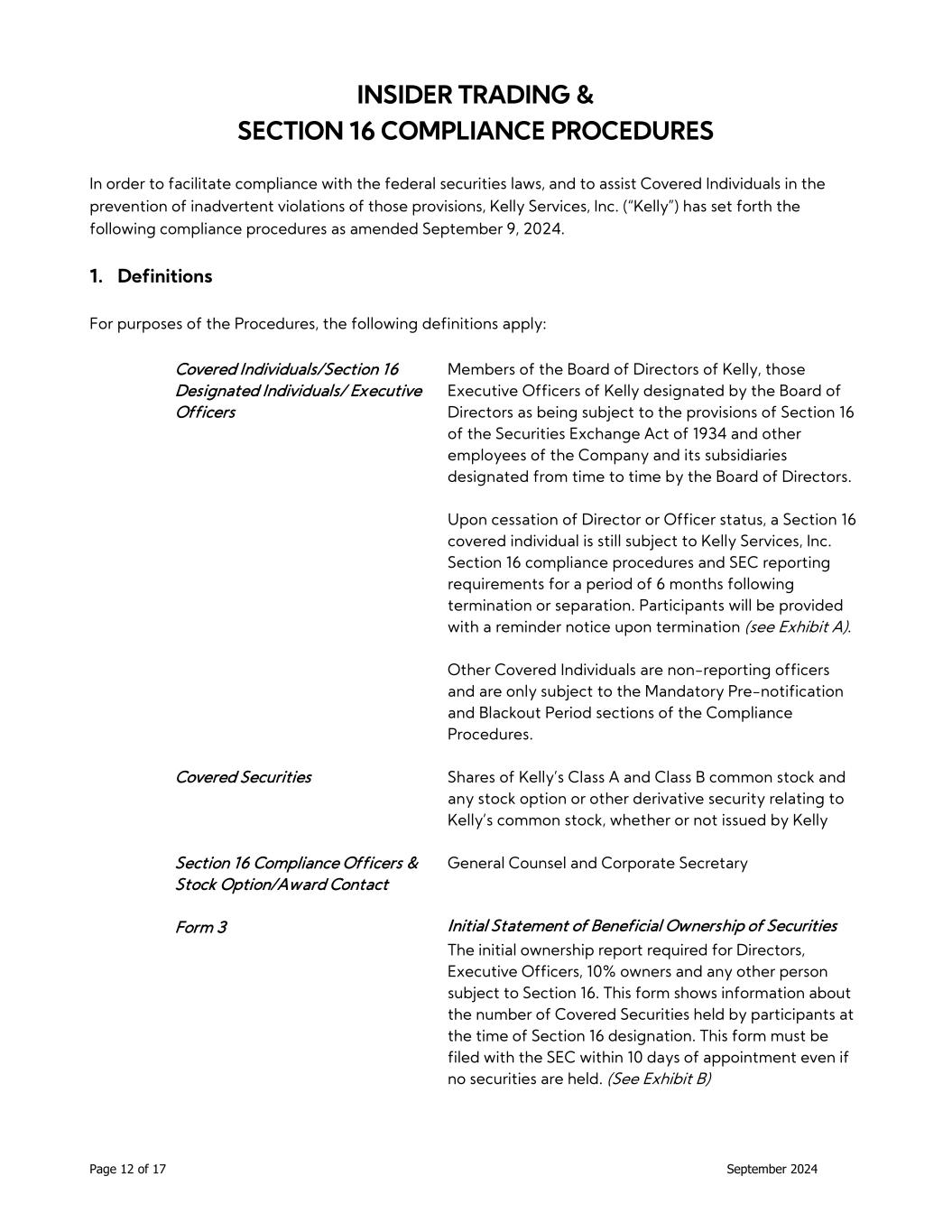
Page 12 of 17 September 2024 INSIDER TRADING & SECTION 16 COMPLIANCE PROCEDURES In order to facilitate compliance with the federal securities laws, and to assist Covered Individuals in the prevention of inadvertent violations of those provisions, Kelly Services, Inc. (“Kelly”) has set forth the following compliance procedures as amended September 9, 2024. 1. Definitions For purposes of the Procedures, the following definitions apply: Covered Individuals/Section 16 Designated Individuals/ Executive Officers Members of the Board of Directors of Kelly, those Executive Officers of Kelly designated by the Board of Directors as being subject to the provisions of Section 16 of the Securities Exchange Act of 1934 and other employees of the Company and its subsidiaries designated from time to time by the Board of Directors. Upon cessation of Director or Officer status, a Section 16 covered individual is still subject to Kelly Services, Inc. Section 16 compliance procedures and SEC reporting requirements for a period of 6 months following termination or separation. Participants will be provided with a reminder notice upon termination (see Exhibit A). Other Covered Individuals are non-reporting officers and are only subject to the Mandatory Pre-notification and Blackout Period sections of the Compliance Procedures. Covered Securities Shares of Kelly’s Class A and Class B common stock and any stock option or other derivative security relating to Kelly’s common stock, whether or not issued by Kelly Section 16 Compliance Officers & Stock Option/Award Contact General Counsel and Corporate Secretary Form 3 Initial Statement of Beneficial Ownership of Securities The initial ownership report required for Directors, Executive Officers, 10% owners and any other person subject to Section 16. This form shows information about the number of Covered Securities held by participants at the time of Section 16 designation. This form must be filed with the SEC within 10 days of appointment even if no securities are held. (See Exhibit B)
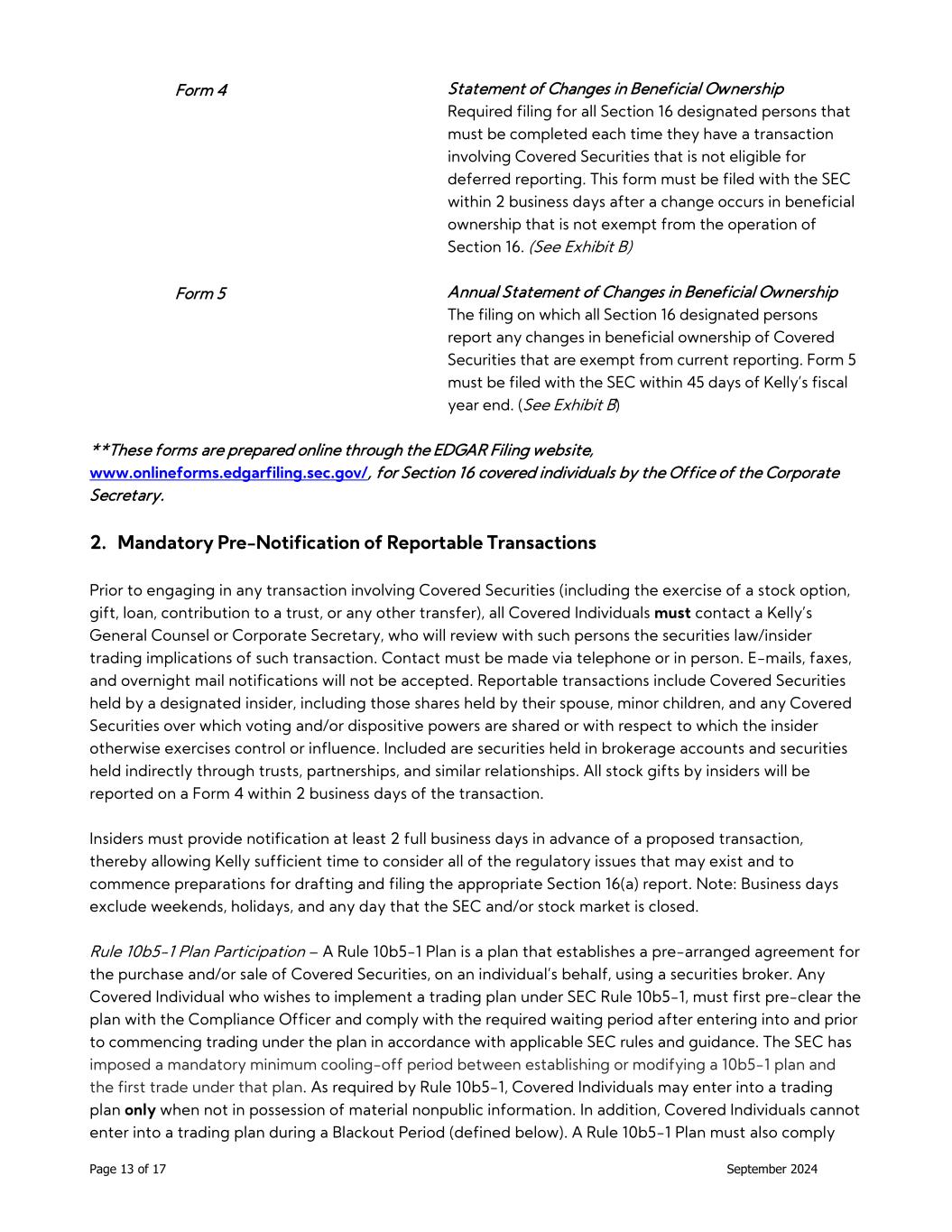
Page 13 of 17 September 2024 Form 4 Statement of Changes in Beneficial Ownership Required filing for all Section 16 designated persons that must be completed each time they have a transaction involving Covered Securities that is not eligible for deferred reporting. This form must be filed with the SEC within 2 business days after a change occurs in beneficial ownership that is not exempt from the operation of Section 16. (See Exhibit B) Form 5 Annual Statement of Changes in Beneficial Ownership The filing on which all Section 16 designated persons report any changes in beneficial ownership of Covered Securities that are exempt from current reporting. Form 5 must be filed with the SEC within 45 days of Kelly’s fiscal year end. (See Exhibit B) **These forms are prepared online through the EDGAR Filing website, www.onlineforms.edgarfiling.sec.gov/, for Section 16 covered individuals by the Office of the Corporate Secretary. 2. Mandatory Pre-Notification of Reportable Transactions Prior to engaging in any transaction involving Covered Securities (including the exercise of a stock option, gift, loan, contribution to a trust, or any other transfer), all Covered Individuals must contact a Kelly’s General Counsel or Corporate Secretary, who will review with such persons the securities law/insider trading implications of such transaction. Contact must be made via telephone or in person. E-mails, faxes, and overnight mail notifications will not be accepted. Reportable transactions include Covered Securities held by a designated insider, including those shares held by their spouse, minor children, and any Covered Securities over which voting and/or dispositive powers are shared or with respect to which the insider otherwise exercises control or influence. Included are securities held in brokerage accounts and securities held indirectly through trusts, partnerships, and similar relationships. All stock gifts by insiders will be reported on a Form 4 within 2 business days of the transaction. Insiders must provide notification at least 2 full business days in advance of a proposed transaction, thereby allowing Kelly sufficient time to consider all of the regulatory issues that may exist and to commence preparations for drafting and filing the appropriate Section 16(a) report. Note: Business days exclude weekends, holidays, and any day that the SEC and/or stock market is closed. Rule 10b5-1 Plan Participation – A Rule 10b5-1 Plan is a plan that establishes a pre-arranged agreement for the purchase and/or sale of Covered Securities, on an individual’s behalf, using a securities broker. Any Covered Individual who wishes to implement a trading plan under SEC Rule 10b5-1, must first pre-clear the plan with the Compliance Officer and comply with the required waiting period after entering into and prior to commencing trading under the plan in accordance with applicable SEC rules and guidance. The SEC has imposed a mandatory minimum cooling-off period between establishing or modifying a 10b5-1 plan and the first trade under that plan. As required by Rule 10b5-1, Covered Individuals may enter into a trading plan only when not in possession of material nonpublic information. In addition, Covered Individuals cannot enter into a trading plan during a Blackout Period (defined below). A Rule 10b5-1 Plan must also comply
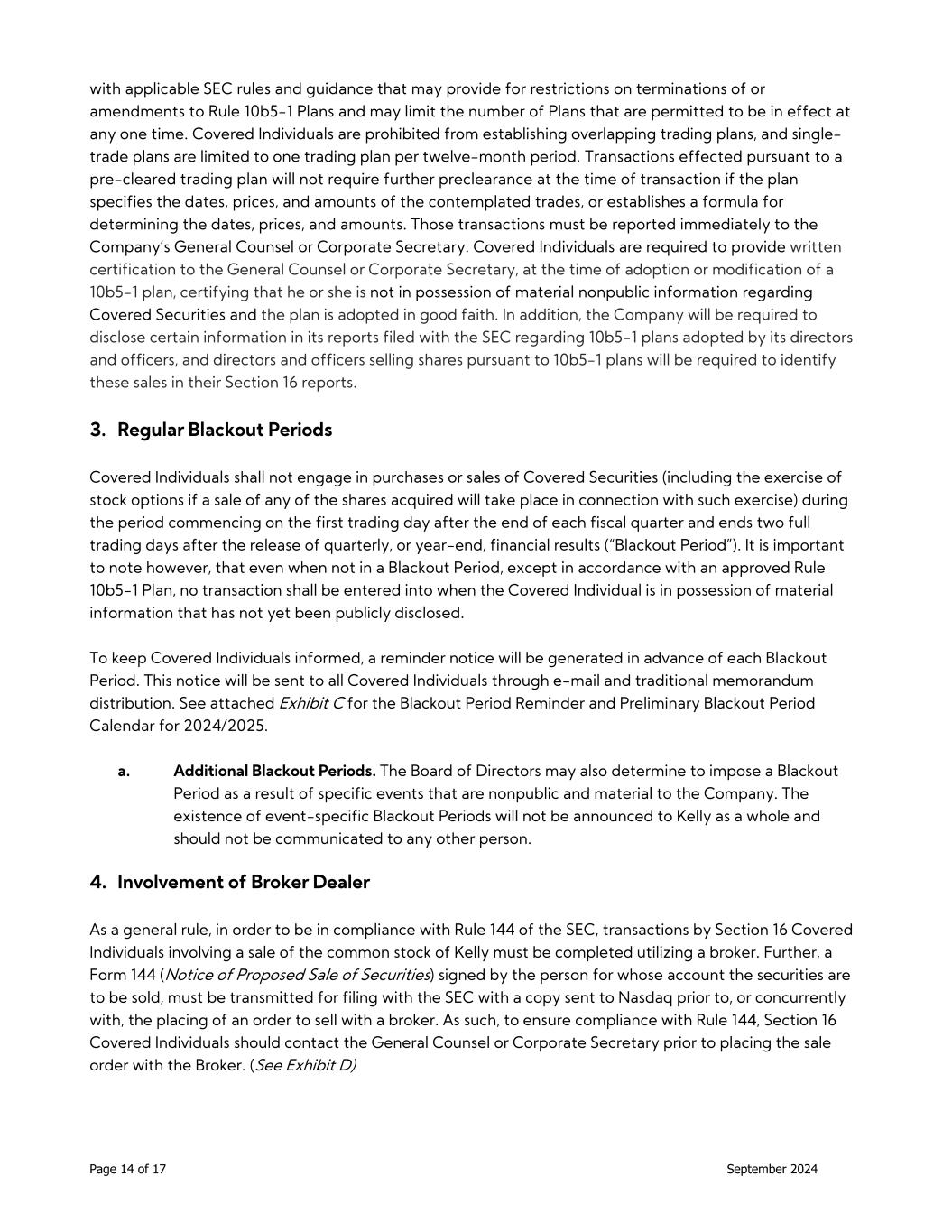
Page 14 of 17 September 2024 with applicable SEC rules and guidance that may provide for restrictions on terminations of or amendments to Rule 10b5-1 Plans and may limit the number of Plans that are permitted to be in effect at any one time. Covered Individuals are prohibited from establishing overlapping trading plans, and single- trade plans are limited to one trading plan per twelve-month period. Transactions effected pursuant to a pre-cleared trading plan will not require further preclearance at the time of transaction if the plan specifies the dates, prices, and amounts of the contemplated trades, or establishes a formula for determining the dates, prices, and amounts. Those transactions must be reported immediately to the Company’s General Counsel or Corporate Secretary. Covered Individuals are required to provide written certification to the General Counsel or Corporate Secretary, at the time of adoption or modification of a 10b5-1 plan, certifying that he or she is not in possession of material nonpublic information regarding Covered Securities and the plan is adopted in good faith. In addition, the Company will be required to disclose certain information in its reports filed with the SEC regarding 10b5-1 plans adopted by its directors and officers, and directors and officers selling shares pursuant to 10b5-1 plans will be required to identify these sales in their Section 16 reports. 3. Regular Blackout Periods Covered Individuals shall not engage in purchases or sales of Covered Securities (including the exercise of stock options if a sale of any of the shares acquired will take place in connection with such exercise) during the period commencing on the first trading day after the end of each fiscal quarter and ends two full trading days after the release of quarterly, or year-end, financial results (“Blackout Period”). It is important to note however, that even when not in a Blackout Period, except in accordance with an approved Rule 10b5-1 Plan, no transaction shall be entered into when the Covered Individual is in possession of material information that has not yet been publicly disclosed. To keep Covered Individuals informed, a reminder notice will be generated in advance of each Blackout Period. This notice will be sent to all Covered Individuals through e-mail and traditional memorandum distribution. See attached Exhibit C for the Blackout Period Reminder and Preliminary Blackout Period Calendar for 2024/2025. a. Additional Blackout Periods. The Board of Directors may also determine to impose a Blackout Period as a result of specific events that are nonpublic and material to the Company. The existence of event-specific Blackout Periods will not be announced to Kelly as a whole and should not be communicated to any other person. 4. Involvement of Broker Dealer As a general rule, in order to be in compliance with Rule 144 of the SEC, transactions by Section 16 Covered Individuals involving a sale of the common stock of Kelly must be completed utilizing a broker. Further, a Form 144 (Notice of Proposed Sale of Securities) signed by the person for whose account the securities are to be sold, must be transmitted for filing with the SEC with a copy sent to Nasdaq prior to, or concurrently with, the placing of an order to sell with a broker. As such, to ensure compliance with Rule 144, Section 16 Covered Individuals should contact the General Counsel or Corporate Secretary prior to placing the sale order with the Broker. (See Exhibit D)
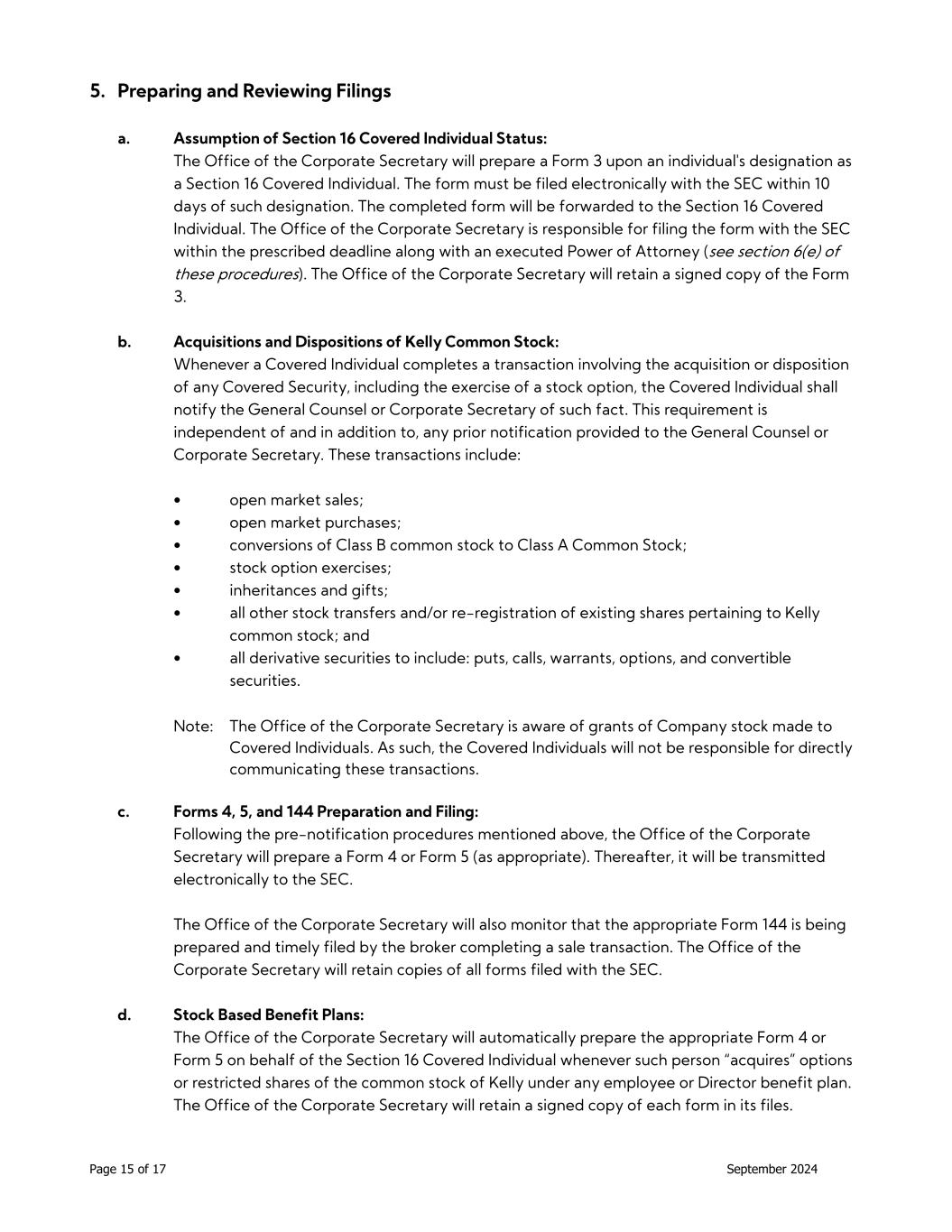
Page 15 of 17 September 2024 5. Preparing and Reviewing Filings a. Assumption of Section 16 Covered Individual Status: The Office of the Corporate Secretary will prepare a Form 3 upon an individual's designation as a Section 16 Covered Individual. The form must be filed electronically with the SEC within 10 days of such designation. The completed form will be forwarded to the Section 16 Covered Individual. The Office of the Corporate Secretary is responsible for filing the form with the SEC within the prescribed deadline along with an executed Power of Attorney (see section 6(e) of these procedures). The Office of the Corporate Secretary will retain a signed copy of the Form 3. b. Acquisitions and Dispositions of Kelly Common Stock: Whenever a Covered Individual completes a transaction involving the acquisition or disposition of any Covered Security, including the exercise of a stock option, the Covered Individual shall notify the General Counsel or Corporate Secretary of such fact. This requirement is independent of and in addition to, any prior notification provided to the General Counsel or Corporate Secretary. These transactions include: • open market sales; • open market purchases; • conversions of Class B common stock to Class A Common Stock; • stock option exercises; • inheritances and gifts; • all other stock transfers and/or re-registration of existing shares pertaining to Kelly common stock; and • all derivative securities to include: puts, calls, warrants, options, and convertible securities. Note: The Office of the Corporate Secretary is aware of grants of Company stock made to Covered Individuals. As such, the Covered Individuals will not be responsible for directly communicating these transactions. c. Forms 4, 5, and 144 Preparation and Filing: Following the pre-notification procedures mentioned above, the Office of the Corporate Secretary will prepare a Form 4 or Form 5 (as appropriate). Thereafter, it will be transmitted electronically to the SEC. The Office of the Corporate Secretary will also monitor that the appropriate Form 144 is being prepared and timely filed by the broker completing a sale transaction. The Office of the Corporate Secretary will retain copies of all forms filed with the SEC. d. Stock Based Benefit Plans: The Office of the Corporate Secretary will automatically prepare the appropriate Form 4 or Form 5 on behalf of the Section 16 Covered Individual whenever such person “acquires” options or restricted shares of the common stock of Kelly under any employee or Director benefit plan. The Office of the Corporate Secretary will retain a signed copy of each form in its files.
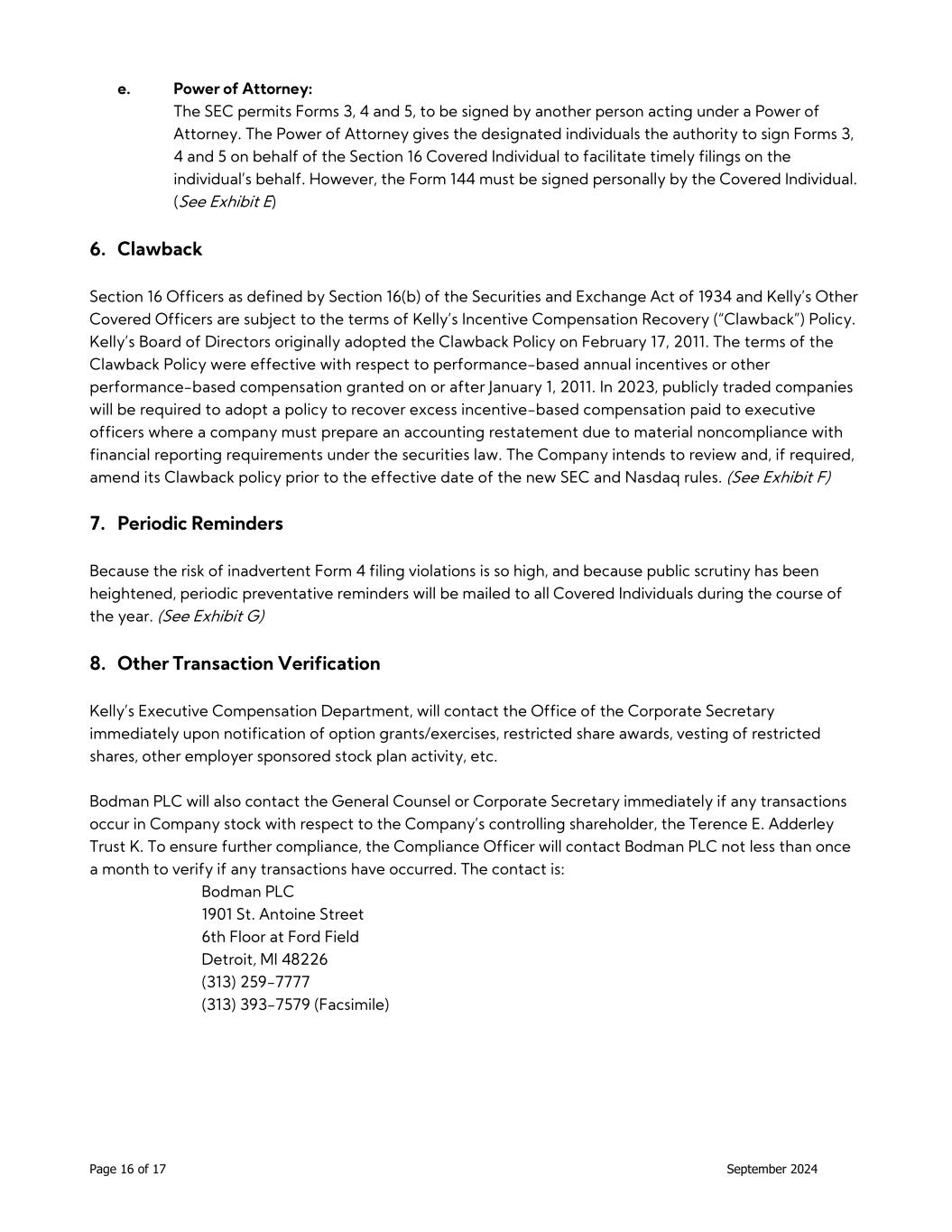
Page 16 of 17 September 2024 e. Power of Attorney: The SEC permits Forms 3, 4 and 5, to be signed by another person acting under a Power of Attorney. The Power of Attorney gives the designated individuals the authority to sign Forms 3, 4 and 5 on behalf of the Section 16 Covered Individual to facilitate timely filings on the individual’s behalf. However, the Form 144 must be signed personally by the Covered Individual. (See Exhibit E) 6. Clawback Section 16 Officers as defined by Section 16(b) of the Securities and Exchange Act of 1934 and Kelly’s Other Covered Officers are subject to the terms of Kelly’s Incentive Compensation Recovery (“Clawback”) Policy. Kelly’s Board of Directors originally adopted the Clawback Policy on February 17, 2011. The terms of the Clawback Policy were effective with respect to performance-based annual incentives or other performance-based compensation granted on or after January 1, 2011. In 2023, publicly traded companies will be required to adopt a policy to recover excess incentive-based compensation paid to executive officers where a company must prepare an accounting restatement due to material noncompliance with financial reporting requirements under the securities law. The Company intends to review and, if required, amend its Clawback policy prior to the effective date of the new SEC and Nasdaq rules. (See Exhibit F) 7. Periodic Reminders Because the risk of inadvertent Form 4 filing violations is so high, and because public scrutiny has been heightened, periodic preventative reminders will be mailed to all Covered Individuals during the course of the year. (See Exhibit G) 8. Other Transaction Verification Kelly’s Executive Compensation Department, will contact the Office of the Corporate Secretary immediately upon notification of option grants/exercises, restricted share awards, vesting of restricted shares, other employer sponsored stock plan activity, etc. Bodman PLC will also contact the General Counsel or Corporate Secretary immediately if any transactions occur in Company stock with respect to the Company’s controlling shareholder, the Terence E. Adderley Trust K. To ensure further compliance, the Compliance Officer will contact Bodman PLC not less than once a month to verify if any transactions have occurred. The contact is: Bodman PLC 1901 St. Antoine Street 6th Floor at Ford Field Detroit, MI 48226 (313) 259-7777 (313) 393-7579 (Facsimile)
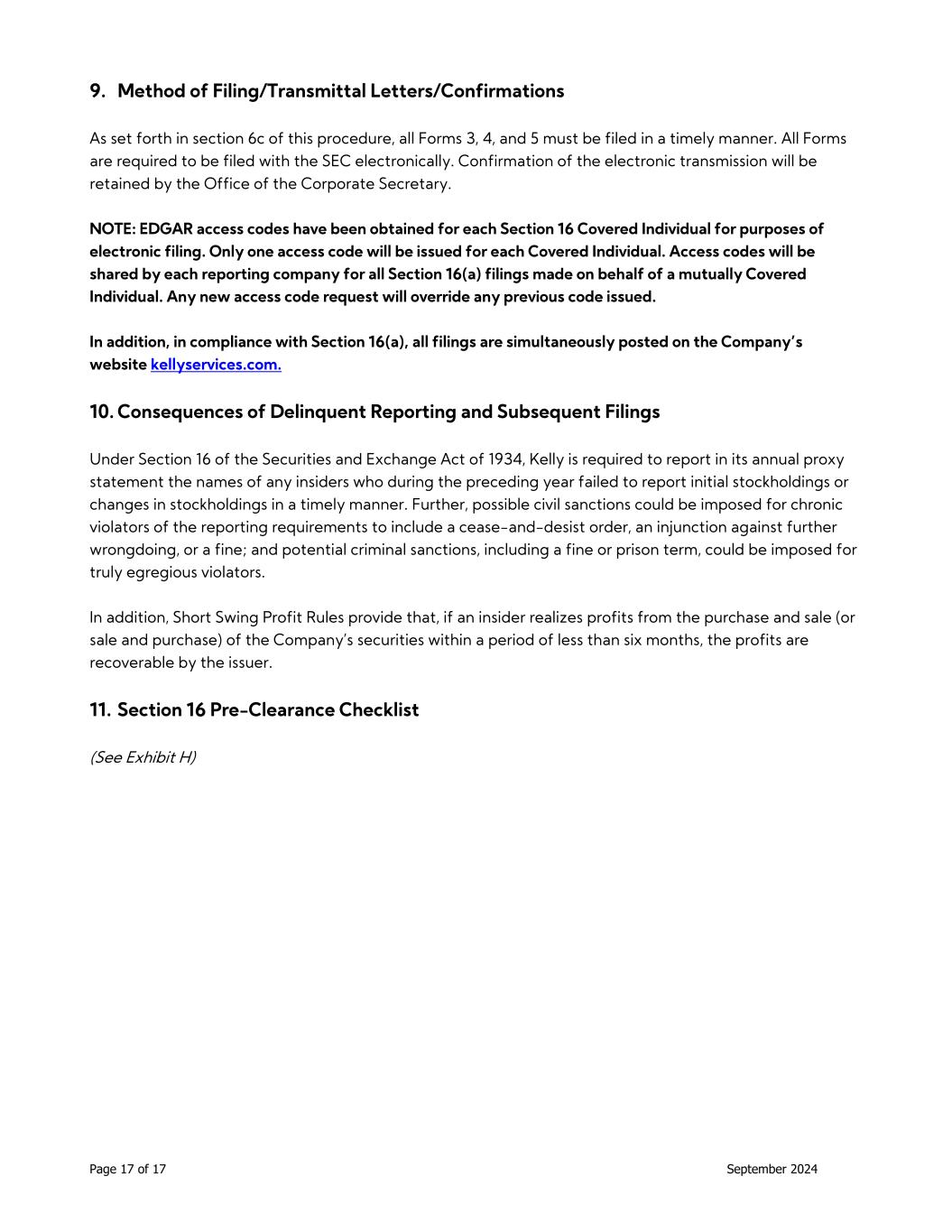
Page 17 of 17 September 2024 9. Method of Filing/Transmittal Letters/Confirmations As set forth in section 6c of this procedure, all Forms 3, 4, and 5 must be filed in a timely manner. All Forms are required to be filed with the SEC electronically. Confirmation of the electronic transmission will be retained by the Office of the Corporate Secretary. NOTE: EDGAR access codes have been obtained for each Section 16 Covered Individual for purposes of electronic filing. Only one access code will be issued for each Covered Individual. Access codes will be shared by each reporting company for all Section 16(a) filings made on behalf of a mutually Covered Individual. Any new access code request will override any previous code issued. In addition, in compliance with Section 16(a), all filings are simultaneously posted on the Company’s website kellyservices.com. 10. Consequences of Delinquent Reporting and Subsequent Filings Under Section 16 of the Securities and Exchange Act of 1934, Kelly is required to report in its annual proxy statement the names of any insiders who during the preceding year failed to report initial stockholdings or changes in stockholdings in a timely manner. Further, possible civil sanctions could be imposed for chronic violators of the reporting requirements to include a cease-and-desist order, an injunction against further wrongdoing, or a fine; and potential criminal sanctions, including a fine or prison term, could be imposed for truly egregious violators. In addition, Short Swing Profit Rules provide that, if an insider realizes profits from the purchase and sale (or sale and purchase) of the Company’s securities within a period of less than six months, the profits are recoverable by the issuer. 11. Section 16 Pre-Clearance Checklist (See Exhibit H)
















